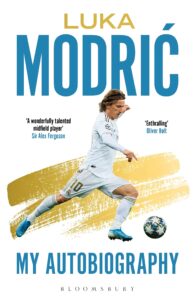Book Review: Luka Modric – My Autobiography
 If Luka Modric had a bucket list, it would surely read something like this: play in the Premier League (tick), become a Galactico (tick), win the Champions League (tick), lead Croatia to their best ever result at a World Cup (tick), win the Ballon d’Or (tick). After all that, there was only one thing left for Croatia’s most capped player to tick off – write an autobiography – and it’s now mission accomplished.
If Luka Modric had a bucket list, it would surely read something like this: play in the Premier League (tick), become a Galactico (tick), win the Champions League (tick), lead Croatia to their best ever result at a World Cup (tick), win the Ballon d’Or (tick). After all that, there was only one thing left for Croatia’s most capped player to tick off – write an autobiography – and it’s now mission accomplished.
Modric emerged onto the global footballing radar in his four-year spell at Tottenham, but he’d already made his mark in his native Croatia at Dinamo Zagreb, via loan spells at Zrinjski Mostar and Inter Zapresic. His story started, though, much earlier, in modest and turbulent roots, set against the backdrop of a brutal Croatian War of Independence that robbed him of his beloved grandfather and his home. Despite these challenges, as the universal footballer narrative goes, Modric was drawn to football. Questions over his size and physicality which lingered throughout a lot of his career were raised early in his formative years, but there was perhaps no better test for a young Modric, nor a better schooling, than the notoriously tough Bosnian Premier League, where he became Bosnian Premier League Player of the Year aged 18. His time at Dinamo Zagreb brought a host of trophies and eventually a move to London, where Modric’s career took off, before his journey became stratospheric at Real Madrid. Modric’s autobiography, however, is bookended by perhaps the most important and yet arguably the most disappointing moment in his career – finishing as runner-up in World Cup 2018. For a nation of some four million people, this is a staggering achievement, but for Modric, a man who has won virtually all there is to win in the game, it initially felt like a failure. His autobiography fills in the story of how a young boy from war-torn Zadar reached the dizzy heights of a World Cup final and becoming the best player in the world.
The style of the autobiography itself is very traditional; there is nothing flamboyant or excessive in the way the book is ordered or told. Although, it’s a nice touch for the book to have 10 chapters – referencing Modric’s hallowed number 10. Modric, who comes across as a modest, humble man, appears as such in the book, but there’s also a hint of steel and tenacity that I hadn’t necessarily expected. The content is much to be expected, however, and gives a thorough overview of his whole life, although detail is sometimes a little bit lacking, but that’s hardly surprising given the amount Modric has to pack in to the book. Indeed, it’s great to have one of the best players of his generation and a recent Ballon d’Or winner not only penning an autobiography but doing so whilst still very much integral at club and national level. There’s a real sense of currency to the book as a result.
It’s also brilliant to see a different culture and nationality represented in footballing autobiographies. Indeed, I don’t think I’ve read another Croatian autobiography, nor I am aware if there are any others, but certainly it’s not the usual fare available. Perhaps Modric’s tome will open the floodgates, not only for other Croatian players – the likes of Davor Suker, Vedran Corluka, Niko Krancar, Davor Suker, Ivan Rakitic, Ivan Perisic, Mario Mandzukic, Domagoj Vida, Dejan Lovren, Eduardo da Silva and Mateo Kovacic, to name a few – but also lesser-represented nations.
I also enjoyed getting a greater sense of Modric the man, as although he’ll be familiar the world over as a footballer, he’s not one of the game’s most accessible personalities, so it’s intriguing to get a glimpse into his character. And anyone who followed the Harry Kane saga this summer will also note a very telling insight from Modric into one of the most formidable chairmen in the modern game – Tottenham’s Daniel Levy. Modric speaks often in the book about fate and had he got his way in negotiations at Spurs, he may have ended up at Chelsea instead of Real Madrid and who knows just how his story would have unfolded then. As it is, having been sold to Los Blancos, Modric went on to win two La Liga titles, a Copa del Rey, three Supercopa de Espana, four Champions Leagues, three UEFA Super Cups and three FIFA Club World Cup, and that’s before any individual accolades. So, however Modric’s career developed, it’s not bad for a boy who was rejected at Hadjuk Split for being too little. The phrase ‘mighty oaks from little acorns grow’ springs to mind here!
Jade Craddock
(Bloomsbury Sport. May 2021. Paperback: 304 pages)